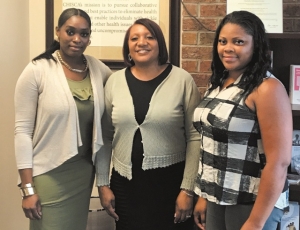Improving length, quality of life for sickle cell patients
By Phyllis Moore
Published in News on September 18, 2017 5:50 AM

News-Argus/PHYLLIS MOORE
Marsha Poston, center, is program manager of Community Health Interventions and Sickle Cell Agency Inc. in Goldsboro. Also pictured are Tameka Ashford, left, health educator, and administrative assistant LaToya Sykes.
Marsha Newsome Poston's passion and life's work for the past 24 years has been working with patients and families of those affected by sickle cell disease.
Many may be unaware, though, that the program manager's office of Community Health Interventions and Sickle Cell Agency has been located in Goldsboro for the past few years.
Housed near the corner of Wayne Memorial Drive and Royall Avenue, its offerings include such services as education and counseling.
Part of the N.C. Department of Public Health, under the Department of Health and Human Services' women's and children's branch, the program has been around for 40 years, Poston said.
"I started as a health educator or counselor and did that for many years," she said. "We cover eight counties -- Carteret, Craven, Onslow, Pamlico, Lenoir, Greene, Wayne and Jones. A few years ago the state made the decision to move this way."
The agency is also unique from other medical programs, which cater to more specific situations or ages.
"We case manage from birth until death," Poston said. "Nobody else does that."
Every child is tested at birth for various disorders, including sickle cell, an inherited red blood cell disorder.
There is essentially no cure for everyone with the disease.
"We have around 70 with the disease (in Wayne County) but hundreds with sickle cell traits," Poston said, noting that there is a difference between the two.
"The disease means that you have inherited it, it can only be passed from parents to child, versus sickle cell trait, where you carry abnormal and a normal hemoglobin gene."
Anyone can be born with the genetic predisposition to have sickle cell, but not everyone will develop the disease. Those in that category are what is called a carrier, and it can still be passed on to their children.
"If a person with trait mates with another person with trait, there's a 25 percent chance that you pass on the gene, a 50 percent chance of having a child with trait," Poston said.
Babies born with sickle cell are prescribed penicillin for the first five years of life, to protect the child against infection.
"It's potentially deadly -- that's the reason for early diagnosis -- because we have a number of treatments out there right now that increase the quality of life or the length of life," she said.
The prognosis years ago used to be more ominous, she said, but she believes the approach is changing.
"We have a patient conference every year. I hear the same things that I have been hearing for 20 years, 'My doctor told me I would not live past 18,'" she said. "I have heard that more times than I could tell you.
"We're getting away from that school of thought because the life expectancy has increased tremendously but we still have a number of challenges that we face."
The symptoms primarily include pain of varying degrees. Other issues can also come up, from stroke, anemia and gallstones to jaundice and pneumonia.
Staying hydrated is especially important, she said, as becoming dehydrated can trigger an episode.
It used to be that patients were unable to hold down a full-time job, Poston said.
But the message is changing, as patients are encouraged to live their lives.
"Now we have a number of people who are successful, contributing to their communities," she said. "They know they have challenges.
"One of the big buzz words now in the sickle cell community is transition, to help young people transitioning from elementary, middle, high school and into adulthood."
The local agency is funded by the state and works closely with the Health Department, since both agencies are notified of a diagnosis.
There is no state funding, though, for some of the incidentals -- when patients can't go to work, transportation and ancillary things.
"That's what the fundraisers are for, what the donations are for, 100 percent of the donations do go to patients," she said.
September is National Sickle Cell Month, with a big push for donations, she added.
Her message to the community is to shine a light on those facing this situation.
"We're here," Newsome said. "We're accessible. When you call us, you're getting a live person.
"We're here, we're strong, we're small but we're passionate. We're just servants. That's what we're here for."
And to make a difference, she added. Especially for that child who goes to college or takes a class or learned a trade and goes on to live their best life.
For more information on the Sickle Cell Agency, call 919-988-8005 or visit communityhealthinterventions.org.
